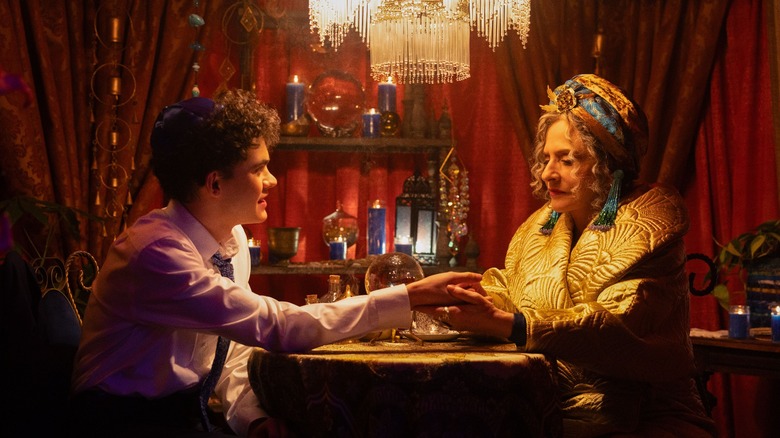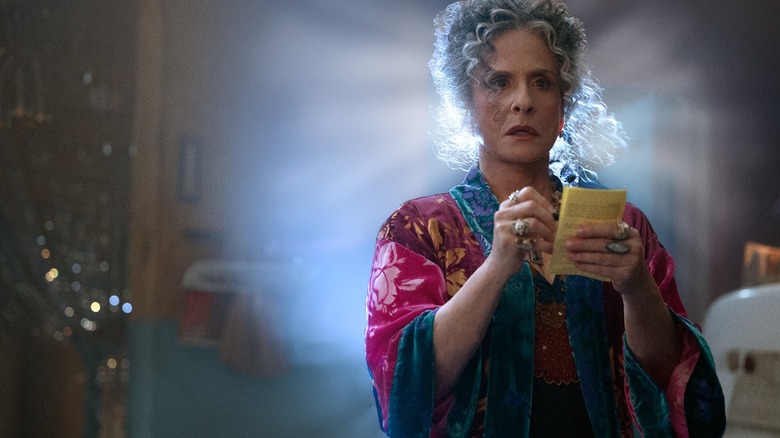Marvel's Agatha All Along Gets One Thing Right That Most Horror Stories Get Wrong
This post contains spoilers for "Agatha All Along."
Episode 7 of "Agatha All Along," titled "Death's Hand In Mine," etches a beautiful, heartbreaking final arc for Lilia (Patti Lupone), whose journey as a divination witch comes to a bittersweet, yet empowering end. Lilia had always been plagued with visions, and her mastery over tarot allowed her to peer into people's pasts and futures: most of her pain stemmed from the fact that this foreknowledge did not help prevent the tragedy that befell those around her. In an earlier episode, it is revealed that Lilia was the one who put a sigil on Billy/Teen (Joe Locke), as she anticipated the life-altering car accident and knew that he would need time to embrace his innate abilities. In the latest episode, Lilia's trial puts her divination skills to the test, urging her to remember who she truly is and use tarot to unveil what remains hidden.
Most popular representations of tarot in media reduce this divination method to a mere gimmick, where nonsensical, surface-level interpretations are assigned to standard decks to a evoke semi-convincing connecting theme. Whenever someone pulls the Death card, it is immediately declared as a portent of doom, or the Fool card is quite literally meant to represent someone who isn't intelligent. There are examples of convincing, profound incorporations of tarot as a metaphor in certain narratives, of course: for instance, every "Persona" game employs the Major Arcana to great effect, using foundational interpretations to further deepen the social links connected to them.
To my pleasant surprise, "Agatha All Along" does a great job of using Tarot to map out an emotional arc, where Lilia's spiritual journey is pieced together through past visions that create a compelling picture of cause and effect. Let's dissect the tarot segment of the trial in the episode, and how it accurately sets up the fates of every character involved.
Lilia's tarot reading reveals the beating heart of Agatha All Along
The trial starts with Billy and Agatha (Kathryn Hahn) scrambling to conduct a tarot reading while swords suspended from the ceiling start randomly falling to the ground. Thanks to Lilia's intense, out-of-order understanding of linear events, she is able to guide herself and Jen (Sasheer Zamata) to the trial and take over the reading, where Billy assumes the role of the querent. Earlier, Lilia had pulled the Tower (Reversed) for William Kaplan, denoting the destruction of a concept on a fundamental level, which comes with a fresh beginning and a silver lining. Although this manifests with Billy's soul latching onto William's body, Lilia realizes that the reading was meant for her all along, and repeats the process as both the querent and diviner.
All seven cards divined represent key characters and situational context relevant to the journey on the Witches' Road:
1. Lilia – The Queen of Cups: Interpreted as empathetic, intuitive, and someone whose inner voice needs to be trusted. This aligns with Lilia's role as a seer, who is both fierce and compassionate and hides her sensitive aspects to convey an air of fortitude. The Queen of Cups is closely linked with fate and one's ability to discern the right path when all hope is lost, which is quite literally what Lilia does inside the tunnels.
2. The Coven – Three of Pentacles: Meant to represent community and collaboration, where every person involved has a seminal role to play. This is true for the coven, as every witch has demonstrated their ability to help the collective out of a sticky situation. This card also traditionally denotes the overcoming of obstacles when like-minded individuals work together as a unit.
3. Alice – The Knight Of Wands: Lilia interprets this as representing bravery and a fiery spirit, which are qualities that Alice (Ali Ahn) embodied right until the end. The Knight of Wands is traditionally interpreted as someone proactive, ready for combat if the need arises, and loyal to their belief systems, no matter what the circumstances might be.
4. Jennifer – High Priestess: This card describes someone with immense spiritual power who is unable or unwilling to use it, which matches Jen's predicament, as she is magically bound. As the potion's witch, Jen has a deep link to the elements, which is also the case with the High Priestess, who holds the key to a vast amount of inner knowledge. Lilia also states that Jen represents the future, hinting that she is yet to play an important role.
5. Agatha – Three of Swords: Lilia assigns this card to Agatha, highlighting her heartbreak, sorrow, and grief, as this card represents immense emotional turmoil that can consume one if not purged. Agatha seems to be driven by grief, which she masks as arrogance when she lashes out while concealing an underlying vulnerability that few are privy to.
6. Billy – The Tower (Reversed): This is a repetition of what Lilia divined for William, denoting disaster and upheaval that brings miraculous transformation along with it. The reversed status usually means that an individual must undergo a metamorphosis that comes with painful realizations, even questioning their identity and core beliefs, which is exactly what Billy is experiencing.
7. Rio – Death: Now, Death does not mean literal death in tarot, but the show subverts this by posing Rio (Aubrey Plaza) as the physical incarnation of Death, which comes for us all. The Death card generally means endings, change, transformation, and transition, which could hint at Rio's role in this journey, as she might be the one waiting for the coven at the end. The themes of transition also apply to souls ferried to the afterlife.

